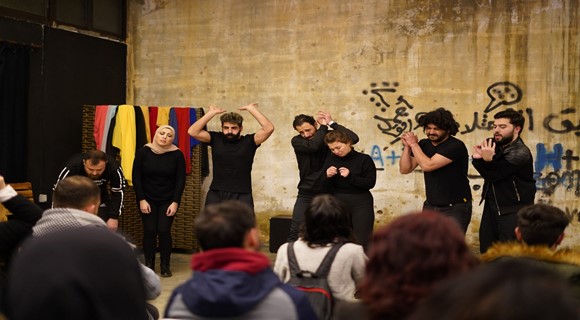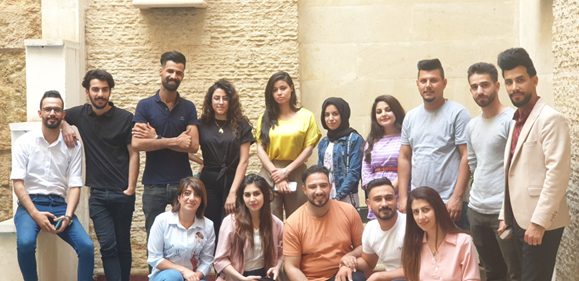Musawat, meaning equality in Arabic, is a regional project implemented by PAX and partners running since 2019 in Iraq, Lebanon, and Palestine.
The project aims to engage young women and men to address discrimination based on religion and beliefs occurring within the social, legal, and political spheres as well as on social media. The program aims to foster Freedom of Religion of Belief (ForB) and to promote key concepts and tools such as dialogue, citizenship, and equal rights among people regardless of religion, gender, belief, and ethnicity. The project is funded by the Dutch Ministry of Foreign Affairs.
The young women and men enrolled in the program promote freedom of religion and belief and seek to bridge these social divides. They engage with their local and religious authorities and raise concerns towards laws and policies that lead to discrimination based on religion, belief, or gender. Monitoring and campaigns on social media contribute to ensuring more constructive exchange and dialogue takes place among youth on the internet.
The types of activities implemented in Iraq, Palestine and Lebanon range from workshops, youth community initiatives, round tables, research related to FORBs, exchange visits, art fairs and summer camps where youth representing diverse religious and ethnic communities’ benefit from coming together and tackle various themes such as gender, cyber security, political involvement, and meaningful representation within their communities.
“We can be models of tolerance around the world” Musawat-participant in Palestine
The project addresses the four identified domains of discrimination – social, political, online and policy discrimination – based on religion or belief.
Desired outcomes:
- Social cohesion and Freedom of Religion and Belief (FoRB) are fostered by bridging social (religious and sectarian) divides, as communities become aware of the notions (rights and duties) of citizenship with equal rights.
- Authorities, including local and religious authorities, are less inclined to discriminate based on religion or belief and gender.
- Social media contributes less to hate, violence and conflict and instead to more mutual, constructive exchange and dialogue between young women and men.
- The space for young people to participate in the debate about the legal framework regarding freedom of religion and belief and equal rights is expanded, and laws are solidified with community- and evidence-based input.
- Regional exchange components in which staff, local implementing partners, experts and/or youth groups exchange on topics of joint relevance leads to more effective, inspired, and informed activities, contributing to the local outcomes in Iraq, Lebanon, and OPT.
Iraq
Musawat partners offer opportunities for young women and young men representing the large diversity of Iraq to meet and develop an understanding of forms and impact of discrimination on the basis of FoRB. They gain knowledge on FORBs and engage in dialogue through diverse online and various social events and training sessions. Youth leaders promote dialogue amongst other youth from their local communities by organizing social cohesion events and activities through awareness sessions and webinars addressing various forms of discrimination.
Palestine
A core group of 50 Palestinian youth have been engaged in the Musawat-project. Demonstrating at the start of project activities an interest in concepts of state-building, democracy, and FoRB, they acquired additional knowledge, skills, and confidence through series of capacity building trainings. Actively contributing to producing research on the status of FoRB and Freedoms in Palestine, the youth can now be seen as frontrunners in promoting the concepts of FoRB. They continue addressing local authorities on the need to promote FoRB and address existing discriminations across Palestine.
Lebanon
Partners in Lebanon are raising sensitization and building knowledge on FORB using different methodologies. Research conducted by partners in Lebanon has highlighted how FoRB comes into play with key relevant themes such as the COVID-19 pandemic, the education sector in Lebanon or women’s rights.
Arts has been used as a key tool to promote dialogue among youth from diverse religious and community backgrounds and address discrimination. In the Beqaa region, music and art are being used as tools to stimulate inter-religious dialogues between youth and religious leaders, and in Tripoli playback theatre is the technique used to engage community members on FoRB related issues.

Regional
PAX ensures that Musawat partners working in the three different countries connect regularly to discuss program strategies and learn from each other. This enables to develop common activities and strengthen regional connections.
In November 2021, PAX and the Musawat-partners hosted the online conference ‘Digital Rights and Freedom of Religion and Belief in the context of Iraq, Lebanon and Palestine’. With the conference, the organizers aimed to create a dialogue between international experts, academics, activists, policymakers, NGO’s, journalists and social media companies to share new insights on protecting and strengthening digital rights and Freedom of Religion and belief. about increasing online discrimination in the Middle East and freedom of religion and belief.
During this conference, interactive workshops and panel discussions with a variety of experts in the field were organized to enhance the conversation on digital rights and FoRB in the MENA-region. Topics included sectarianism and online discrimination in Iraq, Lebanon and Palestine, the impact of Covid-19 on FoRB and digital rights and how online hate speech is manifested against women.
Keynote speakers were Jos Douma (Dutch Special Envoy for Religion and Belief), Marwa Fatafta (Policy Manager of Access Now’s work on digital rights in MENA), Nadim Nashif (Executive Director of 7amleh: The Arab Center for the Advancement of social media) and George Salama (Policy Director MENA Twitter). Recordings of the different sessions are available online.
Contact
Nadine Alidib – Musawat Coordinator n.alidib@paxforpeace.nl
- 7amleh – The Arab Center for the Advancement of social media (Palestine)
- Palestinian Center for Peace and Democracy (Palestine)
- IILHR- institute for International Law and Human Rights (Iraq)
- Haw Organization (Iraq)
- Peace and Freedom Organization (Iraq)
- ALEF: Act for Human Rights (Lebanon)
- Peace of Art (Lebanon)
- SADA (Lebanon)




